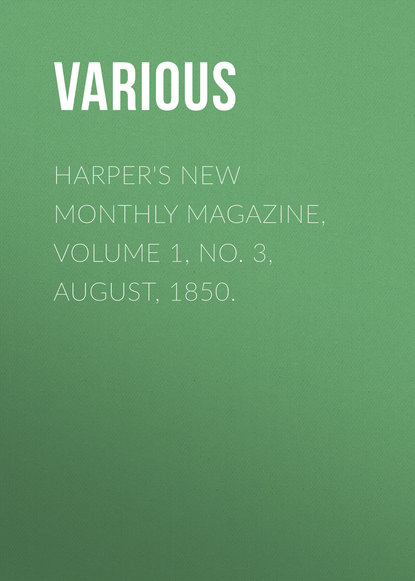По всем вопросам обращайтесь на: info@litportal.ru
(©) 2003-2024.
✖
Harper's New Monthly Magazine, Volume 1, No. 3, August, 1850.
Автор
Год написания книги
2017
Настройки чтения
Размер шрифта
Высота строк
Поля
"Truth is the equal sun,
Ripening no less the hemlock than the vine.
Truth is the flash that turns aside no more
For castle than for cot. Truth is a spear
Thrown by the blind. Truth is a Nemesis
Which leadeth her belovèd by the hand
Through all things; giving him no task to break
A bruisèd reed, but bidding him stand firm
Though she crush worlds."
P. 21, 22.
Take, for its harrowing power, blended with beauty, the description of a "Lost Female," symbolizing the degradation of Italy, and addressed to the heroine of the tale:
"Or, oh, prince's daughter, if
In some proud street, leaning 'twixt night and day
From out thy palace balcony to meet
The breeze – that tempted by the hush of eve,
Steals from the fields about a city's shows,
And like a lost child, scared with wondering, flies,
From side to side in touching trust and terror,
Crying sweet country names and dropping flowers —
Leaning to meet that breeze, and looking down
To the so silent city, if below,
With dress disordered, and disheveled passions
Streaming from desperate eyes that flash and flicker
Like corpse-lights (eyes that once were known on high
Morning and night, as welcome there as thine),
And brow of trodden snow, and form majestic
That might have walked unchallenged through the skies.
And reckless feet, fitful with wine and woe,
And songs of revel that fall dead about
Her ruined beauty – sadder than a wail —
(As if the sweet maternal eve for pity
Took out the joy, and, with a blush of twilight,
Uncrowned the Bacchanal) – some outraged sister
Passeth, be patient, think upon yon heaven,
Where angels hail the Magdalen, look down
Upon that life in death, and say, 'My country!'"
P. 36.
Take, for its wondrous pathos and truth, the description of "Infancy:"
"Thou little child,
Thy mother's joy, thy father's hope – thou bright
Pure dwelling where two fond hearts keep their gladness —
Thou little potentate of love, who comest
With solemn sweet dominion to the old,
Who see thee in thy merry fancies charged
With the grave embassage of that dear past,
When they were young like thee – thou vindication
Of God – thou living witness against all men
Who have been babes – thou everlasting promise
Which no man keeps – thou portrait of our nature,
Which in despair and pride we scorn and worship."
P. 71, 72.
But time would fail us to quote, or even indicate a tithe of the beautiful, melting, and magnificent passages in this noble "Roman." We would merely request the reader's attention to the whole of the sixth scene; to the ballad, a most exquisite and pathetic one, entitled the "Winter's Night;" to the "Vision of Quirinus," a piece of powerful and condensed imagination; and, best of all, to the "Dream of the Coliseum," in scene viii. – a dream which will not suffer by comparison with that of Sardanapalus.
But it is not the brilliance of occasional parts and passages alone, which justifies us in pronouncing the "Roman" an extraordinary production. We look at it as a whole, and thus regarding it, we find – first, a wondrous freedom from faults, major or minor, juvenile or non-juvenile; wondrous, inasmuch as the author is still very young, not many years, indeed, in advance of his majority. There is exaggeration, we grant, in passages, but it is exaggeration as essential to the circumstances and the characters as Lear's insane language is to his madness, or Othello's turbid tide of figures to his jealousy. The hero – an enthusiast – speaks always in enthusiastic terms; but of extravagance we find little, and of absurdity or affectation none. Diffusion there is, but it is often the beautiful diffusion of one who dallies with beloved thoughts, and will not let them go till they have told him all that is in their heart. And ever and anon we meet with strong single lines and separate sentences, containing truth and fancy concentrated as "lion's marrow."
Take a few specimens. Of Italy he says:
"She wraps the purple round her outraged breast,
And even in fetters cannot be a slave."
Again, she
"Stands menacled before the world, and bears
Two hemispheres – innumerable wrongs,
Illimitable glories."
"The soul never
Can twice be virgin – the eye that strikes
Upon the hidden path to the unseen
Is henceforth for two worlds."
"To both worlds
– The inner and the outer – we come naked,
The very noblest heart on earth, hath oft
No better lot than to deserve."
"Before every man the world of beauty,
Like a great artist, standeth night and day
With patient hand retouching in the heart
God's defaced image."
"Rude heaps that had been cities clad the ground
With history."
"Strange fragments
Of forms once held divine, and still, like angels,
Immortal every where."
"The poet,
In some rapt moment of intense attendance,
The skies being genial, and the earthly air
Propitious, catches on the inward ear
The awful and unutterable meanings
Of a divine soliloquy."











